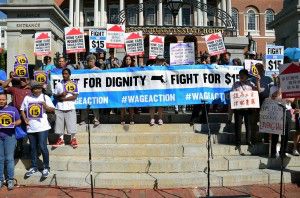
As college students who are constantly in need of cash, working food service jobs is a bleak reality. Freshmen and seniors alike can commiserate on the poor hours, weird smells and pitifully low pay of jobs at fried chicken stands and drive-thru burger joints. Luckily for most of us, our college educations will eventually free us from the life – and paycheck – that comes with turning the deep fryer. But not everyone working in fast food gets to graduate past minimum wage.
On Thursday, fast-food workers across the country gathered to protest what they believe is an obscenely low paycheck. Encouraged by the Strike Fast Food organization, these workers engaged in sit-ins, walkouts and other instances of civil disobedience in over 100 cities in the United States, including Boston. In stirring these protests, the ultimate goal of this campaign, titled “Fast Food Forward, ” is for the minimum wage to be increased from its national minimum of $7.25 an hour to $15 an hour.
Although jobs in fast food are not for everyone, the fact that McDonald’s alone has employed 1 in 8 Americans is evidence that these jobs do not have extensive hiring criteria. In all fairness, it does not require much skill to flip a hamburger or write down a customer’s order. This provides some reasoning for the minimum wage numbers – these workers are not performing rocket science.
Skill requirements aside, there are fast food service workers that serve as the breadwinners of their families. Sure, many of the people taking your milkshake order are attitude-laced teenagers, but too many of them are mothers and fathers with no education, saving every penny of their pathetically low salaries to feed and clothe their families. And for them to be successful, $7.25 an hour is not enough.
In the end, employers reserve the right to dictate their employees’ salaries, so long as they meet each state government’s minimum wage. However, at corporations such as McDonald’s, which employs approximately 1,000,000 workers in the United States alone per year, you can bet they will be paying the majority of them the smallest hourly rate they can get away with. Although this is fine for high school and even college students, these wages in no way add up to a living wage for the uneducated adult workers.
These strikes also call attention to the vicious cycle of abuse of people who could not afford a college education and subsequently need to work at fast food restaurants. Many of these people work interminably long hours to get the most out of their minimum wage paychecks. On the flip side, there are also people who abuse the system of welfare and will work a little bit while collecting unemployment checks, because they don’t want to work and –with government assistance– get paid enough to live modestly. Neither of these cases is ideal.
It is not the responsibility of an employer to take care of its employees, but it is their responsibility to pay them fairly, and maybe it’s time for them to do that. But more importantly, maybe the government should take more interest in the case of the dissenting workers at corporations such as McDonald’s, Dunkin’ Donuts and Burger King, who employ millions of Americans. Ronald McDonald may not have to care about the lives of the workers putting the ketchup on his burgers, but the U.S. government should.
As a response to complaints from workers like the ones currently protesting, Massachusetts Gov. Deval Patrick raised the Commonwealth’s minimum wage to $11 an hour on June 26. This rate is about on par with the Massachusetts Institute of Technology’s “Living Wage Calculator” estimate that a living wage in Massachusetts is about $11.31 an hour. However, in many states across the county, the minimum wage remains a paltry $7.25 an hour, despite MIT’s estimation that a living wage for this state translates to about $11.13 an hour.
It’s time for each state government to take a good hard look at what it costs to live in its borders and set a minimum wage compliant with those estimations. Employers should care about their workers, but it is not their duty to. On the other hand, as the governing body of the people, it is the government’s responsibility to set regulations that encourage a pay that can support the lives of citizens at the end of the pay scale.




















































































































